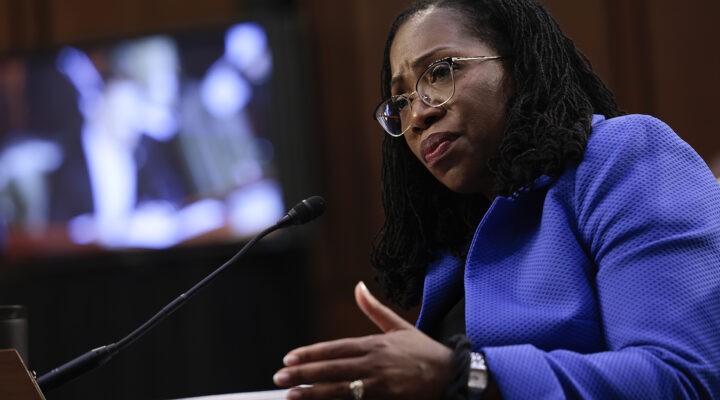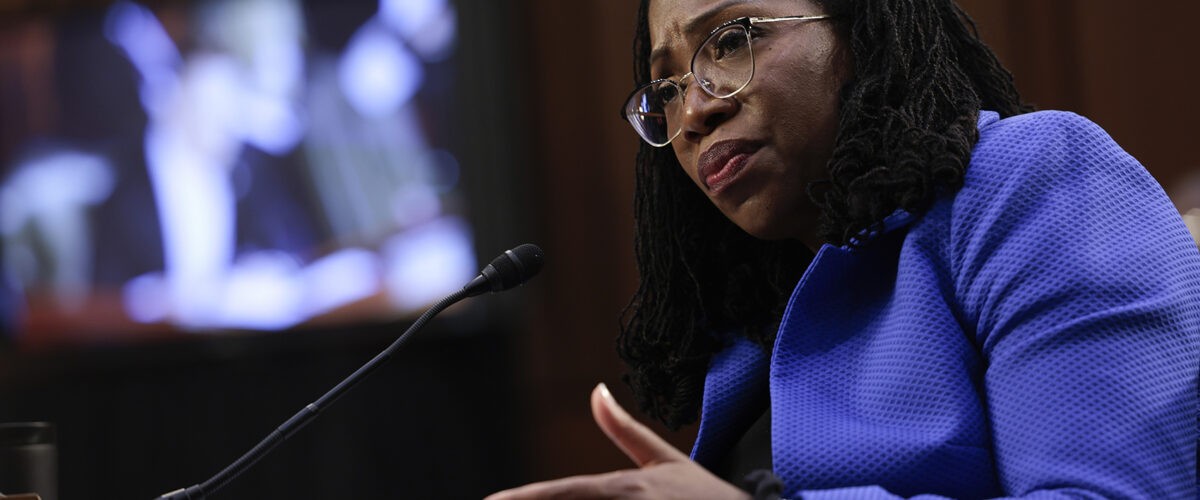“She has a vast practical experience, something that I think is a real plus. … I will vote no.”
“I can say definitively that I like her. I think she’s a good person, but I cannot support her.”
“She seems like a wonderful human being. She comes with some impressive qualifications, academically and professionally. … I will vote no.”

Brianna Childs
“A gifted person. She’s fought hard to be where she’s at in life. … I will vote no.”
“I enjoyed the opportunity to meet her family. They obviously are and should be proud of her achievements. … I can’t support her nomination.”
As a woman in ministry, I can’t help but see the correlation between these quotes from the Senate votes for the confirmation of new Supreme Court Justice Ketanji Brown Jackson and the response to women in leadership in the church. It’s the same song, different verse of yet another woman in a position of leadership who is overqualified but still overtly discriminated against and held to a much higher standard than her male counterparts.
On one hand, Jackson’s confirmation as the first Black woman Supreme Court Justice of the United States of America was one of the most beautiful moments in our country’s history. On another hand, these quotes from senators who voted against her confirmation prove how patriarchy and discrimination on multiple levels are baked into the fabric of our country.
“These quotes from senators who voted against her confirmation prove how patriarchy and discrimination on multiple levels are baked into the fabric of our country.”
Jackson is only the sixth woman to be appointed out of 115 justices who have served across time. If we could see a timeline of all the pastors over time like we can see of the Supreme Court justices of the United States, I wonder if it might look similar. Women have been and continue to be shut out of leadership. Women of color have been even more oppressed.
Some of us are treated only as the exception to the rule — sure, maybe you are called to ministry because of your leadership and character, but overall, women are not. We are usually forced even further into believing we must compete against each other as women. There are only so many pieces of the pie to go around, so it’s either you or her, take your pick.
This scarcity mindset is only reinforced by those with power who are afraid of giving up what they have held for so long. Instead, I believe there is always a better, more abundant way. We do not have to compete against each other as women, but rather we can free ourselves from the internalized patriarchy and cheer each other on, knowing each journey is just as special as the other.
Even more, when I look at these quotes, I also think about how many women in ministry aren’t even afforded a second look because their resumé doesn’t have years and years of experience like a man’s might. When churches examine their resumes and experience, they ought to account for the lack of opportunities women have had in their lives. Women might not have multiple years, or any years at all, in a senior pastor role, but it’s often because of the discrimination that still happens across the world. We have been kept from those experiences.
It’s past time to make changes on every level, especially in the church. Rather than following the cultural oppression of women, we should be leading the world into a better way forward. We should be proactively hiring women in leadership in the church. It should not be an afterthought or a hiring in spite of womanhood. Rather, we should be celebrating the gifts of women all over the world.
Jackson said, “There are also women I have never met but who are recorded in the pages of history and whose lives and struggles inspire me and thousands of other working women to keep putting one foot in front of another every day.”
“I dream of a day when women no longer will be praised for their resilience and strength and instead be free to thrive as they feel best for themselves.”
There are women in politics, in the church and in all different environments who still inspire me to put one foot in front of the other, too. Throughout history and still today, we have seen the systematic oppression of women. It is a wonder that women keep going, but we do. We keep making the world turn with our labor in the workforce and at home, not to mention the emotional labor, which is the process of managing feelings and expressions to fulfill the emotional requirements of a job.
I am inspired when I look back over time and know that I stand on the shoulders of women who have paved the way for the opportunities I have now. I am eternally grateful and at the same time I see how we can keep moving forward. There is always room for both.
I dream of a day when women no longer will be praised for their resilience and strength and instead be free to thrive as they feel best for themselves.
I dream of a day when we do not have to operate in scarcity, but we can know there is always an abundance of paths for women to follow into leadership.
I dream of a day when the church does not discourage, limit and traumatize women but instead leads the way in its practical affirmation of women in all capacities.
Even if it is not in my lifetime, I hope these dreams come true. Watching the confirmation of Ketanji Brown Jackson was a momentous decision for women, especially Black women, everywhere. I hope we continue to celebrate just as momentous occasions in the church, too.
Brianna Childs serves as a pastoral resident at Wilshire Baptist Church in Dallas. She graduated in 2021 with a master of divinity degree from George W. Truett Theological Seminary and a master of social work degree from the Diana R. Garland School of Social Work at Baylor University.
Related articles:
Black Baptist women in ministry and the principality of patriarchy | Opinion by Aidsand Wright-Riggins
Q&A with Meredith Stone about Baptist Women in Ministry
Why Baptist women in ministry feel a kinship to Justice Ginsburg | Opinion by Meredith Stone


